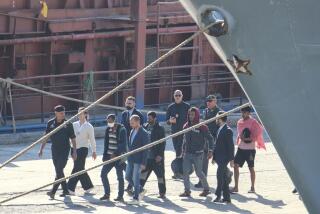Thousands of Albanians Mob Seaside, Desperate to Flee
- Share via
DURRES, Albania — When the boat she so desperately awaits finally arrives, Valentina Koci will grab her two young daughters and make a mad dash toward the sea.
“It is so dangerous,” Koci conceded, “but we are dead here. If we stay, we are dead.”
Koci and thousands of other Albanians were camped out Sunday in this shabby port, hoping to board speedboats, ferries and fishing vessels to escape a country torn by anarchy, political violence and economic disaster.
The exodus that began several days earlier had become increasingly tense and harrowing Sunday. In the morning, government police opened fire when faced with a surging crowd of would-be refugees, according to Koci and half a dozen other witnesses. The police used batons to beat back the crowd and shot just over their heads when they tried to storm the docks. Several people were wounded.
At least two people were killed in a similar incident the day before when government vigilantes in ski masks fired on Albanians trying to flee the country, witnesses said. And a police officer was shot to death Saturday at a Durres roadblock.
Sunday’s gunfire--which occurred on a national day of mourning in memory of the more than 100 believed killed in the unrest--came as European Union foreign ministers agreed to dispatch military advisors to Albania and as an important opposition leader who escaped during a mass jailbreak last week received a government pardon.
In Durres, Albania’s largest port, dejected men, women and children huddled under palm trees or stretched out along railway tracks. Some had been there for days, most waiting for the chance to sneak onto a boat and sail 50 miles to Italy.
When the crisis began earlier this year with the collapse of pyramid schemes that sucked the life savings from hundreds of thousands of Albanians, European officials worried about new waves of refugees. They remembered the scenes of Albanians clinging to the sides of boats in the frantic 1991 flight that followed the end of 45 years of isolationist communism in the country.
The current exodus has not yet reached those proportions, but it is likely to grow--and the desperation seems every bit as intense.
Crowds have stormed military helicopters evacuating foreign nationals, scaled the sides of boats and braved hazardous waters in an attempt to escape the country. The Italian coast guard has made several rescues of refugees whose vessels ran aground.
On Sunday, U.S. Marines who are in Albania to evacuate American citizens were deployed at the beach near Durres to push back crowds menacing the airlift of about 250 Turkish diplomats and civilians.
The Italian government said Sunday that more than 4,000 Albanians, telling scary tales of choppy seas and rickety boats, had reached its shores. Some apparently paid as much as $1,000 a head to smugglers--but many seemed to have just hitched a ride.
Italian authorities said they already felt overwhelmed but would try to accommodate the arrivals, at least temporarily.
“We can’t throw them into the sea,” Italian Prime Minister Romano Prodi said.
Crouched on the gray-sand beach in Durres, about 20 men gazed at the horizon dotted with naval warships. Most said they wanted to go to Italy to find jobs.
“We who don’t have weapons have to flee the country,” said Hamit Mema, a 32-year-old construction worker who had a loaf of bread wrapped in his coat and was spending his third day at the port. “We are terrified of the guns.”
Like many Albanians, Mema sold his house and invested the proceeds in a pyramid scheme, lured by promises of easy and outrageously high returns. When it collapsed, he was left penniless.
*
Liman Kukli, a 55-year-old army officer forced into retirement when communism fell, was dressed in a coat and tie for his attempt to cross the sea.
“We are afraid to live in Albania,” the gray-haired man said. “There is no state, no government, no nothing. In one more week, there will be no bread to eat in Albania.”
Durres’ harbor warehouses and the rest of the city, which is 20 miles west of the capital, Tirana, have been the scene of widespread pillaging. The port has been closed to commercial traffic because of the violence sweeping the country.
President Sali Berisha, whose resignation is demanded by a wide range of political and armed opponents, has not appeared in public for several days. But on Sunday he made a concession to the opposition by pardoning leading Socialist Party official Fatos Nano, who was among hundreds of prisoners who fled the central prison last week and is seen by many Albanians as one of the country’s most capable politicians.
Nano, jailed in 1993 on corruption charges that the U.S. State Department has questioned, was part of an amnesty Berisha decreed for 51 prisoners with less than two years left to serve.
A divided Europe, meanwhile, decided Sunday to send military and police advisors--pointedly, not troops--to Albania to help restore order. EU foreign ministers, meeting in the Netherlands, declined an Albanian government plea for more direct military intervention.
More to Read
Sign up for Essential California
The most important California stories and recommendations in your inbox every morning.
You may occasionally receive promotional content from the Los Angeles Times.














